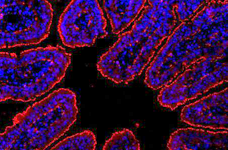General Anatomy / Mucosal Immunology
Academic staff members
Prof. Dr. med. Hermann-Josef Rothkötter
Dipl.-Ing. Ph.D. Stefan Kahlert
Dr. rer. nat. Constanze Nossol, Dipl.-Biol.
Dr. med. Sandra Petzold, physician
Dr. rer. nat. Silke Storsberg, Dipl.-Biol.
Research activities
Our laboratory started working on current topics in gut mucosal immunology in the summer of 2003. The intestinal immune system with its cellular and humoral components defends the mammalian organism against  potentially pathogenic microorganisms and generates tolerance towards nutritional antigens. Our group investigates the induction of mucosal immune responses by comparative analysis of lymphocyte migration and proliferation in the intestinal tract under steady state conditions and after antigen application. Also, we examine the morphological and functional characteristics of intestinal dendritic cells.
potentially pathogenic microorganisms and generates tolerance towards nutritional antigens. Our group investigates the induction of mucosal immune responses by comparative analysis of lymphocyte migration and proliferation in the intestinal tract under steady state conditions and after antigen application. Also, we examine the morphological and functional characteristics of intestinal dendritic cells.
Antibody or cytokine production are analysed by ELISA-spot tests or in situ-hybridisation, respectively, for further functional characterisation of the different leukocyte populations. In addition to routine histology, phenotypic characterisation is performed by flow cytometry, multi-colour immunofluorescence microscopy and digital morphometry. State-of-the-art methods in biochemistry and molecular biology are also applied in our group.
Current projects
Postnatal development of the intestinal immune system
During the postnatal period, the intestinal immune system has to adapt to a large number of microbial and nutritional antigens. The adaptation process is studied using the pig as a model animal. As part of the fifth and sixth framework programme of the EU, this project is carried out in co-operation with nine other European institutions. (http://www.rennes.inra.fr/healthypigut, www.cordis.lu, www.feedforpighealth.org).
Further information: Forschungsportal: HealthyPiGut [5th Framework Programm], Forschungsportal: Feed for Pig Health [6th Framework Programm]
Effects of feed contaminants on the mammalian organism
Mycotoxins in food have as yet unknown effects on the digestive tract and the mammalian organism in general. We are studying these aspects in the DFG-sponsored co-operation project together with the Forschungsanstalt für Landwirtschaft, Braunschweig in the project “Influence of the mycotoxin deoxynivalenol on protein turnover and the immune system of pigs”.
Further information: Forschungsportal: Deoxinivalenol
T cell development in the intestinal immune system
An ongoing co-operation with Dr. W. Holtmeier from the Department of Internal Medicine, Johann-Wolfgang-von-Goethe University, Frankfurt, addresses the development and compartmentalisation of the mucosal immune system in response to bacterial and viral stimulation. In this project, the development of the g/d T cell repertoire in the pig as a model animal is studied by CDR3 spectratyping.
Further information: Forschungsportal: Gamma/Delta T-Zellen
Morphology and function of dendritic cells in the intestinal mucosa
This co-operation project with the University of Veterinary Medicine, Hanover (Institute of Virology) and the GBF, Braunschweig (Department of Immunology and Cell Biology) is funded by the DFG, graduate college 745 “Mucosal-Host-Pathogen interactions”. Dendritic cells in the intestinal mucosa are analysed following initial studies of mucosal DNA vaccination mechanisms.
Further information: Forschungsportal: Graduiertenkolleg, Graduiertenkolleg 745






